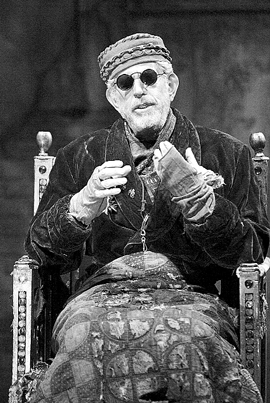Zero-sum decisions bedevil the future of humanity—all four of its members
A chess term, endgame technically refers to the third and final section of the game that results in the surrender of the king, following an unsuccessful campaign of resistance to the inevitable obliteration.
In his 1957 play of the same name, set partially underground in a chamber evocative of a bomb shelter, Samuel Beckett expanded the metaphor to apply to the world on the brink of extinction, in which each interaction has but one purpose—to avoid surrender to the impending, and potentially inevitable, alienation.
As with “Waiting for Godot,” Beckett never provides tidy resolutions. That play is about waiting for salvation, while “Endgame” is about anticipating obliteration. Neither ever comes, and Beckett intentionally denies us the traditional cathartic moments of so-called “well-made plays.” In so doing, he challenges and dispels our illusions of order, allowing the tensions of the drama to continue resonating with the audience members as they return to the world without a pat on the head or any assurance that things will be hunky-dory in the world. Ultimately, death is abated only so long.
Hamm, who is blind, is immobilized in a chair on wheels yet runs a decrepit household by barking orders at Clov, a man who serves him yet constantly threatens to leave. The only other characters are Hamm’s parents, Nell and Nagg, who poke their upper bodies from their trashcan containers to interact with each other and the world. The play takes place on what might be an ordinary day near the end of the world as each character holds onto life, not necessarily out of any will to live but because it is human nature to survive as long as possible.
The four characters may, or may not, be the last living souls on the earth, but the ending may reduce their number. Clov leaves, or doesn’t. Nell dies, or doesn’t. But as Hamm says in his final soliloquy, “Old endgame lost of old, play and lose and have done with losing.” It is a prayer rather than a statement, to be released from the game, to have done with the “moments for nothing.” It is not, finally, the end that is terrifying, but the waiting for the end and the shattering of the ego-driven illusions that humans might exert any god-like control over fate.
Since first encountering this play many years ago, I have been intrigued by it, not merely for its dramatic power but for its thematic similarities to Shakespearean and Greek tragedy. At its heart, it is a classic tale of man versus the gods, in this case the omnipotence of nuclear annihilation, suggested at throughout the play. The play is unrelentingly bleak to those whose reality is based on avoiding the ultimate end. To Beckett, there is great comedy not in the end of the world per se but in the futility of human will attempting to shape a reality over which, by definition, it has no control. It is the ultimate irony of human existence, and irony can be funny.
Director Charlotte Moore in the wonderful new production at the Irish Repertory mines the play for its bittersweet humor and consistently delivers a moving rendition of the kind of helpless fugue state the characters have all fallen into as they wait for the end. They may all be headed for the abyss and nothingness, but they are not without perspective.
Beckett’s stage direction calls for Hamm to be seated merely on a “chair on castors,” but Moore places him in a prop throne such as might be seen in a production of “King Lear.” Tony Roberts, in a magnificent performance, plays Hamm like an old actor (a “ham” actor at that), overlaying the character with mannered artifice that highlights the characters egotism and helplessness. Mr. Roberts is largely immobilized, but with great swaths of rouge on his cheeks such as a provincial actor might use to create an illusion of youth and vitality, a threadbare dressing gown and ensconced on his ersatz throne, this is the picture not of the triumph but the torment of the will. Adam Heller as Clov gives a fine, economical and powerful performance. Clov’s coping strategy is to be a kind of obsessive compulsive, and he is as trapped as Hamm is despite his mobility. Alvin Epstein and Kathryn Grody as Nagg and Nell, respectively, add warmth to the piece, staying upbeat even as everything is taken away from them on their way to ending up, as Shakespeare puts it, “sans teeth, sans eyes, sans taste, sans everything.”
The amazing and understated set by Hugh Landwehr goes beyond Beckett’s direction of a bare interior. He has fashioned a kind of bunker from what looks like old stage flats. It is a wonderful design concept that ingeniously frames the question of whether or not artifice is a necessary diversion or an impediment to accepting one’s reality. Consistent with the rest of the production, it is thoughtful, beautifully rendered and wonderfully disquieting.
That directors are staging Beckett minus any sacrosanct treatment is a testament to current production choices.
Along with the Classic Stage Company’s exciting and risky production of “Happy Days,” this “Endgame” is poignant in the context of our contemporary culture. Throughout both plays, the characters keep asking “What’s happening?” “What next?” The answers are neither trustworthy nor conclusive, but the questions must be asked.
gaycitynews.com


































